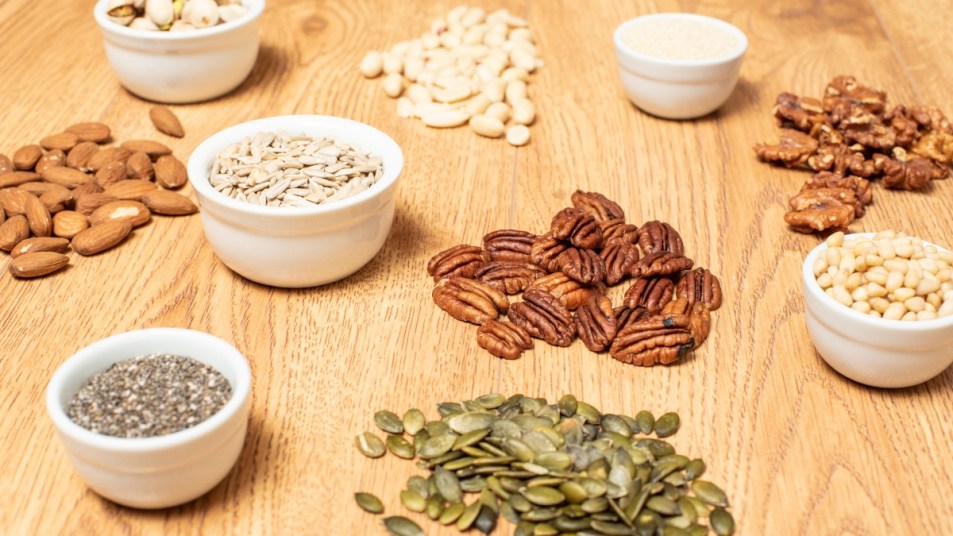Eating More of This Trace Mineral May Relieve Anxiety and Stress

Feeling anxious or stressed? Unfortunately, many of us have felt waves of those two emotions far too often in recent years. With all the change and isolation that’s happened, it’s understandable if your mental health isn’t at its best. However, there is something you can do to take charge of your wellbeing. Research shows that diet plays a huge role in our mental health, and you may be missing out on an important trace mineral that could help ease anxiety: magnesium.
Can magnesium really ease anxiety and stress?
A growing body of research suggests that magnesium may be a natural, inexpensive treatment for anxiety. A 2020 study published in Nutrients, for instance, noted that people who suffer from psychological stress often have low levels of magnesium. A deficiency can also cause further stress on the body, increasing feelings of anxiety.
A scientific review from 2017, which was also published in Nutrients, explored the relationship between magnesium and anxiety. In reviewing 18 studies, the researchers found that magnesium supplements had a positive effect on participants with either mild anxiety, premenstrual syndrome (PMS), postpartum mental health issues, or hypertension (high blood pressure).
Why might magnesium help with anxiety? Researchers note that the mineral is vital to the function of our nervous system. It also plays a protective role in our neurons, or our brain cells that send messages throughout the brain and nervous system. Furthermore, it helps the nervous, endocrine, and immune systems communicate and regulate emotions and reactions. In doing so, it plays a role in helping to prevent feelings of stress and anxiety.
The bottom line? Magnesium may very well help reduce symptoms of anxiety and stress, but it’s complicated. Certain stressors (like work, health issues, or personal life) can easily exacerbate anxiety to the point that a magnesium supplement won’t help at all. However, that doesn’t mean magnesium doesn’t have benefits for mental health. More research needs to be done before we have a definitive answer.
How much magnesium should you take in a day?
The National Institutes of Health (NIH) state that adult women who are 31 years old and older should consume at least 320 milligrams (mg) of magnesium daily. Fortunately, many magnesium supplements come in low doses, such as the NOW Foods Magnesium Caps, which are 400 mg each (Buy from iHerb, $10.53). However, some brands offer higher doses.
Your doctor may suggest that you take a higher dose if you have an illness that can cause magnesium deficiency, such as kidney disease, Crohn’s disease, or parathyroid issues. In addition, the liquid form of this mineral is best absorbed by the body — the absorption rates of other forms of magnesium (like pills and powder) vary. Keep in mind that these supplements may cause cramps, nausea, and diarrhea, especially when taken in higher doses.
What foods contain magnesium?
If your doctor doesn’t suggest that you take a supplement, you can easily reach 320 mg per day through your diet (and consuming magnesium via food may make it easier on the stomach). As listed by the NIH, foods that contain magnesium include:
- Pumpkin seeds (156 mg in one ounce)
- Chia seeds (111 mg in one ounce)
- Dry, roasted almonds (80 mg in one ounce)
- Boiled spinach (78 mg in 1/2 cup)
- Dry, roasted cashews (74 mg in one ounce)
- Peanuts, roasted in oil, (63 mg in 1/4 cup)
- Soymilk, plain or vanilla (61 mg in one cup)
- Cooked black beans (60 mg in 1/2 cup)
- Shelled, cooked edamame (50 mg in 1/2 cup)
- Peanut butter, smooth (49 mg 2 tablespoons)
You can quickly meet your daily requirement by eating two ounces of pumpkin seeds and a tablespoon of peanut butter.
Of course, feelings of anxiety and stress won’t be solved with a one-step approach like eating a little more magnesium. Work, home life, and genetics are huge factors, and it’s important to talk with your doctor if you need help easing anxiety. But by being more mindful about the role diet has in your mental health, you may be able to ease some of your symptoms.
















